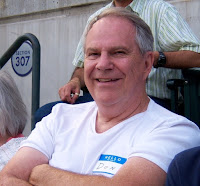Growing up Mormon is like growing up Jewish; it’s a way of life
as well as a theology. The way of life includes certain non-negotiable events, including (if you’re male) a mission for the church and marriage and family.
I served my mission in French-speaking countries from age 19 to 22, married,
and had a family with three children. In hindsight always at some level
knew I was gay but never came to terms with it until 1979 at the age of 38.
After struggling with owning my identity for many years, I
eventually came out to my family, ended my marriage, and left my church.
I began attending coming out meetings with a group of gay men in
Denver, leading me to participate with a group of them in the first March on
Washington for Gay and Lesbian Rights in 1979.
I had requested excommunication from the Mormon Church, which
procedurally includes a trial. My trial was scheduled for the morning of
that march. With the time difference between Washington and Colorado, my
trial ended as the march began, 7 a.m. Boulder time and 9
a.m.Washington time.
As my friends and I parked and headed toward the assembly point
for the march, I was vividly aware of the time, and as we stepped onto the
mall, I looked at my watch and realized that the trial was over and I was out
of the church. This was highly emotional for me, and I began to quietly
cry.
At that very moment I looked up and two men were unfurling a
banner that said “Gay Mormons United.” The synchronicity felt like an
affirming message from God. I ran over to the men and blubbered out my
story. One of the men took me in his arms and held me, and stepping back,
he shook my hand and said, “Congratulations, Welcome home.” And all the
pieces fell into place.
The march ended at the Washington Monument, which was open to
the tourists, and for a moment in history, the odds were changed and I was part
of the majority and the straight tourists were the minority. I realized
that they were intimidated by our presence and were quietly looking at the
ground. I thought to myself, “I have spent my whole life looking at the
ground. Never again.”
Upon returning from the march to the University in Boulder, I
came out to my colleagues at the University and then to my students in my very
large (500 students) Human Sexuality class.
I had been advised against being public by many people,
particularly regarding the impact it might have on my career and future.
But from the point of view of personal integrity, it felt as though if I had
not come out to my class, it would have been the equivalent of running a
marathon and not crossing the finish line.
The public coming out led to both television and newspaper
coverage, which in turn produced a large number of contacts from gay Mormons,
gay married men, and closeted people in general, who for the first time had a
name of someone they could contact. This process has become one of the
most gratifying experiences of my life.
As trite as it might sound, I’m still thoroughly convinced that
the single most important political act each of us who is gay or lesbian can do
is to come out in every possible setting.
In coming out, I lost my traditional church and biological
family and gained an immense new family of choice of gays, lesbians, and
allies. “I once was lost but now I’m found.” My redemption came on
the Washington, D.C. mall in 1979.
© 1 Sep 2015
About the
Author
Don was born in Twin Falls, Idaho in 1941. He grew up in western Idaho outside of Boise.
He was raised in a Mormon family and
followed that cultural script, including undergraduate and MA degrees at BYU
(Brigham Young University), and a Ph.D. from the University of Minnesota. He did a mission for the Mormon Church in
French-speaking countries and married and had three children. He became a psychotherapist at the Counseling
Center at the University of Colorado in the 1970s and came out as a gay man in
1979. Since his divorce, he has been
involved in national marches on Washington, PFLAG, national speaker on
developmental issues for gay and lesbian youth, Founder and President of
Boulder County AIDS Project, taught human sexuality at the University of
Colorado, and is currently retired and living in Denver.


No comments:
Post a Comment